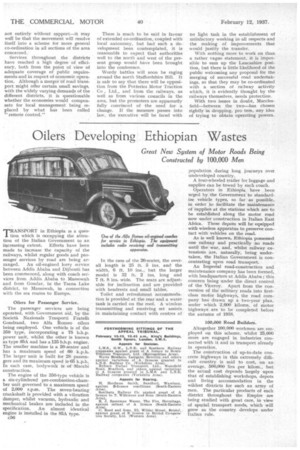Oilers Developing Ethiopian Wastes
Page 106

If you've noticed an error in this article please click here to report it so we can fix it.
Great New System of Motor Roads Being Constructed by 100,000 Men
'TRANSPORT in Ethiopia is a ques tion which is occupying the attention of the Italian Government to an increasing extent. Efforts have been made to increase the capacity of the railways, whilst regular goods and passenger services by road are being ar ranged. An oil-engined lorry service between Addis Ababa and Djibouti has been commenced, along with coach services from Addis Ababa to Massowah and from Gondar, in the Tsana Lake district, to Massowah, in connection with the sea routes to Europe.
Oilers for Passenger Service.
The passenger services are being operated, with Government aid, by the Societa, Nazionals Trasporti Fratelli Gondrand, two Alfa Romeo oilers being employed. One vehicle is of the 350 type, incorporating a 75 b.h.p. power unit, whilst the other is known as type 85A and has a 125 b.h.p. engine. The smaller machine is a 20-seater and has a maximum speed of 60 k.p.h. The larger unit is built for 28 passengers and its maximum speed is 65 k.p.h. In each case, bodywork is of Macchi construction.
The engine of the 350-type vehicle is six-cylindered pre-combustion-chamber unit governed to a maximum speed of 2,000 r.p.m. The seven-bearing crankshaft is provided with a vibration damper, whilst vacuum, hydraulic and mechanical brakes are included in the specification. An almost identical engine is installed in the 85A type. c56
In the case of the 20-seater, the overall length is 25 ft. 5 ins, and the width, 6 ft. 10 ins., but the larger model is 32 ft. 2 ins, long and 7 ft. 8 ins. wide. The seats are adjustable for inclination and are providedwith headrests and small tables.
Toilet and refreshment accommodation is provided at the rear and a water tank is carried on the roof. A wireless transmitting and receiving set assists in maintaining contact with centres of population during long journeys over undeveloped country.
A four-wheeled trailer for luggage and supplies can be towed by each coach.
Operators in Ethiopia have been urged by the Government. to standardize vehicle types, so far as possible, in order to facilitate the maintenance of supplies at the stations which are to be established along the motor road now under construction in Italian East Africa. These depots will be equipped with wireless apparatus to preserve contact with vehicles on the road.
As is well known, Ethiopia possessed one railway and practically no roads until the war, and, whilst railway extensions are, naturally, being undertaken, the Italian Government is concentrating upon road transport.
An Imperial road-construction and maintenance company has been formed, with headquarters at Addis Ababa; this concern being under the direct control of the Viceroy. Apart from the conversion of the military roads into firstclass motor highways, the road company has drawn up a two-year plan, under which 2,600 kiloms. of motor highways are to be completed before the autumn of 1938.
100,000 Road Builders.
Altogether 100,000 workmen are employed on this scheme, whilst 25,000 more are engaged in industries connected with it and in transport already in operation.
The construction of up-to-date concrete highways in this extremely difficult country is said to cost, on an average, 500,000 lira per Idiom., but the actual cost depends largely upon that of establishing workshops, depots and living accommodation in the wildest districts for such an army of men. The particular products of each district throughout the Empire are being studied with great care, in view of spe,cial transport needs, which will grow as the country develops under Italian rule.




























































































































































